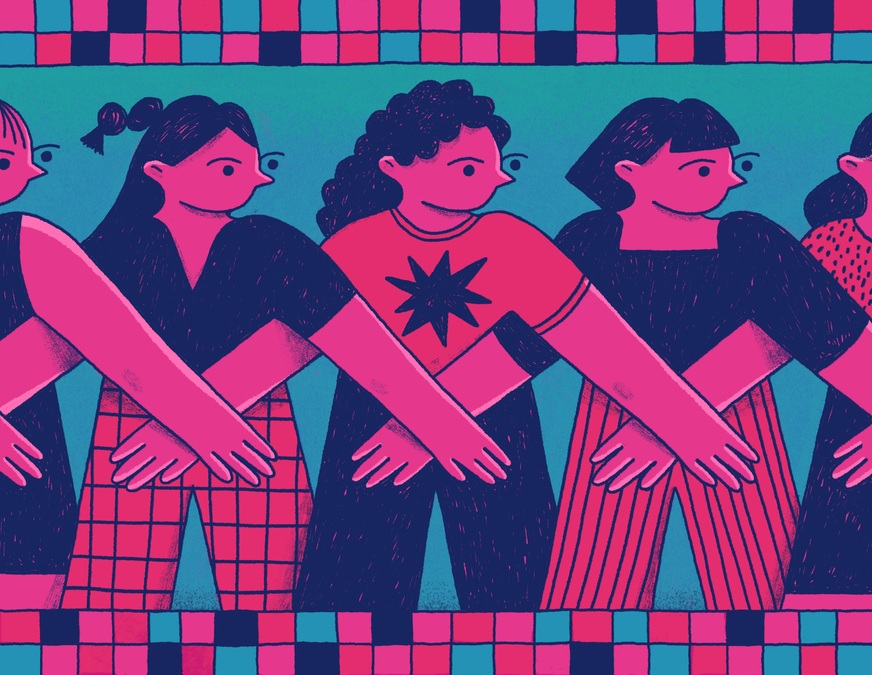Changing the Act: Decriminalising abortion in Scotland
Outdated and harmful, Scotland’s abortion law demands urgent modernisation. We speak to the campaigners behind Let’s Change the Act about the importance of decriminalisation
In the last days of summer, I mention to my friends that I am writing about an upcoming campaign to decriminalise abortion in Scotland. One asks why, given that abortion is already legal. Another echoes them. My friends are somewhat confused; admittedly, much like I am when said campaign is first brought to my attention. It is an uncomfortable truth to acknowledge: that my friends and I – and likely, countless other individuals – have made it this far under the misguided belief that we, as individuals living in Scotland, have an unconditional right to abortion.
October marks the launch of Let’s Change the Act, a collective national campaign that seeks to end criminal penalties by fully decriminalising abortion in Scots law and replace the 1967 Abortion Act with a modern, rights-respecting healthcare model. Engender, Scotland’s feminist policy and advocacy organisation, is joined by a coalition of campaign stakeholders, such as Back Off Scotland, Amnesty Scotland, Abortion Rights Scotland, and many more. “Let's Change the Act is led by a coalition of medical, policy and legal experts and human rights and equality campaigners,” says Jade Stein, Communications and Engagement Manager at Engender. “It is vital to have this breadth and diversity of experience within our coalition, when campaigning for the full decriminalisation of abortion and replacement of the Abortion Act 1967 with a modernised, rights-based framework for abortion care. Our coalition brings us strength and a huge range of expertise.”
Quality and timely abortion care is integral to our physical, mental, and emotional health. With the NHS estimating that one in three women* will access abortion in their lifetime, it is vital, routine healthcare. Meanwhile, public opinion is overwhelming in its support. In January 2024, 93% of those polled by YouGov agreed that ‘Women should have the right to an abortion.’ And yet, under the current law, pregnant people in Scotland have no legal right to end a pregnancy. The Abortion Act 1967 outlines circumstances in which an abortion may be permitted: two doctors must authorise all abortions; an individual seeking an abortion must demonstrate that their reason sits within specific ‘grounds’; and the abortion must be provided in specific locations, by specific healthcare professionals. Under this act, abortion remains within criminal law.
It is easy to consider such laws as nothing more than a technicality – an outdated yet necessary filing system. But the law is taken as fact, not fiction. The Concealment of Birth (Scotland) Act 1809 criminalises concealing a birth if the ‘child be found dead or be amissing’. Although the act does not directly govern abortion, it has reared its ugly head in recent years to prosecute individuals when an illegal abortion is suspected. Over the past 20 years, at least eight people have been investigated for offences relating to abortion, as noted in data released from Police Scotland in response to Engender’s FOI request. South of the border, we’ve seen an increase in prosecutions for abortion related offences. In England and Wales, 67 people have been prosecuted over the last ten years. As Stein notes; “We need to future proof now, against an increase in unnecessary prosecutions, as has been seen in England.” Here, at home in Scotland, individuals have indeed been charged and prosecuted for crimes related to abortion in the 21st century. The emotional and mental distress of this upon an individual cannot be overstated.
Jen Ang, Director of Lawmanity, is a human rights lawyer. With over 20 years of experience and qualified to practice in New York State, England and Wales, and Scotland, Ang’s expertise is expansive. “Criminalisation of abortion harms individuals and communities, by using the enforcement powers of the state – the police, prosecutors and the prison services – to create fear and stigma about a woman's choice to access their fundamental human right to reproductive health care,” Ang tells us. The criminalisation of abortion – and the stigma it creates – does not keep us safe; it puts us at risk.
For Ang, the need to decriminalise abortion is, undoubtedly, a human rights issue. “Access to safe, legal and timely abortion healthcare is a fundamental human right, and should not be regulated with criminal penalties,” says Ang. The World Health Organisation recommends the decriminalisation of abortion, while countless international human rights organisations likewise advocate for the matter. It’s troubling, then, that our government refuses to listen to those in the know. “With a few notable exceptions, countries around the world are modernising and liberalising their laws on abortion care – and we, in Scotland, run the risk of falling behind.”

Illustration by Vaso Michailidou.
Likewise, in the UK, the Trades Union Congress (TUC) and Scottish Trades Union Congress (STUC) advocate for the decriminalisation of abortion in regards to workplace rights. Indeed, abortion is not detached from financial realities. Public Health Scotland found that the 19% increase in abortion rate in Scotland seen in 2022 is linked to the cost of living crisis; financial concerns are frequently cited alongside requests for a termination. In the same report, it was also noted that the abortion rate in the most deprived areas of Scotland is now double that of the most affluent areas.
Meanwhile, as we all know, the NHS is struggling – staff shortages, insufficient funding, long waiting times. As it stands, the law puts an added unnecessary pressure on healthcare professionals. The Scottish Abortion Care Providers argue that other appropriately trained individuals should be able to provide abortion care – not simply doctors. Gratuitous requirements such as these do not make abortion care safer; simply, more difficult to access.
In Engender’s 2024 report, Dr. Audrey Brown, Consultant in Sexual and Reproductive Healthcare and former Chair of the Scottish Abortion Care Providers, states: “Recent cases in the media have raised suspicions when women present with a later pregnancy loss. Instead of clinical staff focusing on care and support for the woman, they can be uncertain if they must report a potential crime.” Care, rather than criminality, ought to be the priority of all healthcare – and Scotland’s current abortion laws force professionals to straddle the two. With stigma surrounding abortion persisting, many healthcare professionals have raised concerns that individuals may delay abortion care; this, in turn, can increase the risk of varied complications.
Decriminalising abortion does not mean that abortion care would not be appropriately regulated. Malpractice or unsafe abortion would be dealt with by medical regulations and existing general law – just as any other form of healthcare is. As Stein says, “Abortion is treated differently from other forms of crucial healthcare under the law without medical justification; we must urgently eradicate this stigma, there is no place for it in modern Scotland.”
The campaign for abortion rights is, of course, nothing new. “When I was a teenager growing up in the United States, it was feminism and the pro-choice movement that first drew me into activism. The first demo I ever attended was a pro-choice rally at the home of then President George Bush Sr at Kennebunkport, Maine in November 1989,” says Ang, reflecting on her involvement in the current campaign. “We rented a bus and raised money by selling tickets at $5 to other high school students. We thought it was only a matter of time before women’s reproductive choice would finally be secure, in all 50 states. It is amazing to think that we are fighting for the same rights, now, some 35 years later.” In recent years – in both the UK, USA, and beyond – the rights of multiple marginalised groups have been stripped back. Abortion has predictably found itself on the table of public debate, laid out to be picked at and prodded. Such times call for us to move forward, rather than retreat.
And so, what does getting involved with Let’s Change the Act look like? In encouraging individuals to email their MSP, sign up to the newsletter, and donate, where possible; the campaign makes involvement easy yet impactful.
This autumn, my friends and I will discuss the need to decriminalise abortion in Scotland. We will understand our rights and we will know which rights we still have to advocate for. We will say to each other and to our government, “Let’s change the Act.”
Find out more about Let's change the Act on Instagram @letschangetheact
*Much of the available legal, health-based and research material refers only to cisgender women. Engender's 2024 report recognises that transgender men and boys, people who identify as non-binary or gender diverse and people who are intersex can also become pregnant and need access to abortion
